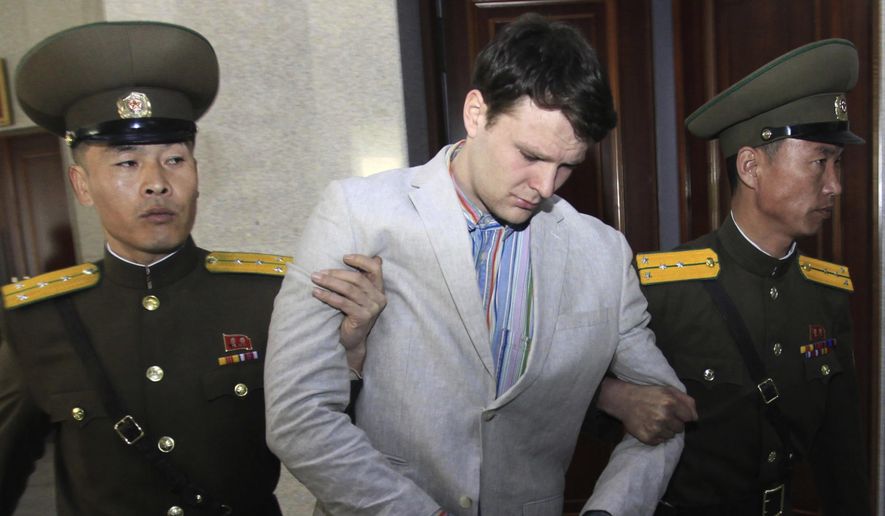North Korean officials reportedly presented a $2 million hospital bill to the Trump administration in 2017 for the alleged cost of the medical care to American college student Otto Warmbier, who died later that year shortly after being released from a North Korean prison.
North Korea demanded that the invoice, which has not previously been publicly disclosed by U.S. or North Korean officials, be paid in full as a condition for releasing Warmbier, but the bill sat unpaid in the Treasury Department throughout 2017.
The University of Virginia student’s fate has proved a barometer of the remarkable course of U.S.-North Korean relations since President Trump took office. Mr. Trump early in his term championed Warmbier’s cause on human rights grounds while promising to unleash “fire and fury” on Pyongyang after a series of missile and nuclear tests — only to turn around and secure a moratorium on military tests and hold two face-to-face meetings with North Korean leader Kim Jong-un in a quest for a still-elusive peace deal.
The White House was not commenting on the medical bill story, which was first reported in The Washington Post on Thursday, although the U.S. government has long had a policy of not paying ransom demands for American hostages.
“We do not comment on hostage negotiations, which is why they have been so successful during this administration,” White House press secretary Sarah Huckabee Sanders said in a statement.
The State Department and Treasury Department also declined to comment.
North Korea has denied all accusations that Warmbier died as a result of torture and insisted he suffered an allergic reaction to a sedative given to him after he became sick from eating pork and spinach while in detention. The North is known for demanding payments for expenses of foreigners detained in its extensive prison system.
The student’s fate has figured prominently in ongoing U.S.-North Korean diplomacy. Mr. Trump said the incident helped bring him and Mr. Kim together for their first summit last year in Singapore by focusing both sides’ attention on the need to deal with the crisis.
“I think without Otto, this would not have happened …,” he told reporters in Singapore. “Otto was someone who did not die in vain.”
But Mr. Trump sparked fresh controversy — and an implicit rebuke from Warmbier’s parents — after the Hanoi summit in February, when he said he took Mr. Kim at his word when the North Korean leader claimed he had not been aware of Warmbier’s plight.
“Those [North Korean] prisons are rough, they’re rough places, and bad things happened,” Mr. Trump said. “But I really don’t believe that [Mr. Kim] knew about it.”
Diplomatic complication
Still, news of the medical billing signals that the Warmbier case could complicate Mr. Trump’s hopes for a comprehensive peace deal with Pyongyang.
According to reports, Joseph Yun, the former U.S. special representative for North Korea who played a key role in Warmbier’s June 2017 release, informed then-Secretary of State Rex W. Tillerson of the bill when he arrived in Pyongyang to initiate the comatose student’s evacuation. Mr. Tillerson informed Mr. Trump, but it appears the U.S. never paid the bill even though Warmbier was allowed to fly home.
He died in an Ohio hospital six days later without ever regaining consciousness.
Sen. Rob Portman, an Ohio Republican on the Senate Foreign Relations Committee, declared that “the United States owes [North Korea] nothing. They owe the Warmbier family everything.”
“Otto Warmbier was mistreated by #NorthKorea in so many ways, including his wrongful conviction and harsh sentence,” he tweeted Thursday, “and the fact that for 16 months they refused to tell his family or our country about his dire condition they caused.”
Fred Warmbier, Otto’s father, told The Post he was never informed about the hospital bill and said it sounded like a ransom for his son.
Secretary of State Mike Pompeo has rejected notions that the U.S. pays ransom for hostages around the world. At an event last year attended by Mr. Warmbier’s parents, Mr. Pompeo said, “Please remember that any money to a terrorist or terrorist regime gives money so that they can seize more of our people.”
The president has also maintained that the U.S. has not paid for North Korean hostages, including three other Americans whom Pyongyang released in May 2018 in advance of the Singapore summit. At a rally after the return of the hostages, Mr. Trump said that “Kim Jong-un did a great service to himself and to his country by doing this. But those hostages came out, with respect. We didn’t pay for them.”
Warmbier was imprisoned for nearly two years after North Korean officials accused him of attempting to steal a political poster while on a guided tour of the country and was sentenced to 15 years of hard labor.
Warmbier’s parents sued the Kim regime a year ago for the wrongful death of their son. The complaint, filed in federal court in the District of Columbia, said North Korea “committed acts of torture, hostage taking, and extrajudicial killing.” The lawsuit sought economic damages.
In a largely symbolic victory for the Warmbiers, the U.S. court in December ordered North Korea to pay $500 million in damages. However, the family is unlikely to receive the money because there is no mechanism to force the country to pay.
• Lauren Toms can be reached at lmeier@washingtontimes.com.




Please read our comment policy before commenting.